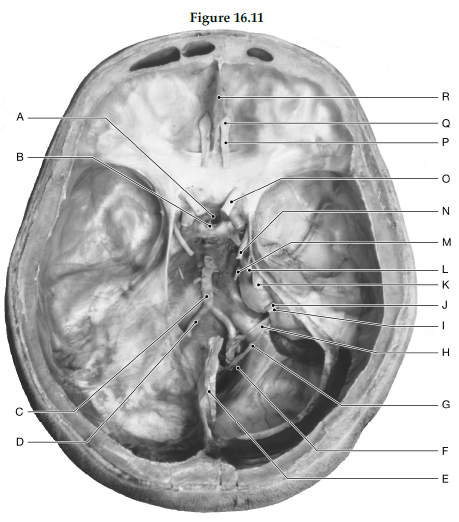Using the figure below, identify the labeled part.

1) Label A: ______________________________
2) Label B: ______________________________
3) Label C: ______________________________
4) Label D: ______________________________
5) Label E: ______________________________
6) Label F: ______________________________
7) Label G: ______________________________
8) Label H: ______________________________
9) Label I: ______________________________
10) Label J: ______________________________
11) Label K: ______________________________
12) Label L: ______________________________
13) Label M: ______________________________
14) Label N: ______________________________
15) Label O: ______________________________
16) Label P: ______________________________
17) Label Q: ______________________________
18) Label R: ______________________________
1) Diaphragma sellae
2) Infundibulum
3) Basilar artery
4) Vertebral artery
5) Falx cerebri (cut
6) Hypoglossal nerve (N XII
7) Spinal root of accessory nerve
8) Roots of glossopharyngeal (N IX
9) Vestibulocochlear nerve (N VIII
10) Facial nerve (N VII
11) Trigeminal nerve (N V
12) Trochlear nerve (N IV
13) Abducens nerve (N VI
14) Oculomotor nerve (N III
15) Optic nerve (N II
16) Olfactory tract
17) Olfactory bulb (termination of N I
18) Crista galli
You might also like to view...
Which is the anatomical term for a passageway through a bone?
A) sulcus B) sinus C) fossa D) trochlea E) meatus
Of all the senses, the sense of ______________ is the most primitive
Fill in the blank(s) with correct word
Smooth muscle contractions help to propel sperm cells in the ________.
A. seminiferous tubule B. seminal receptacle C. rete testis D. ejaculatory duct E. ductus deferens
The auditory ossicle called the "anvil" is also known as the ________
A) malleus B) incus C) stapes D) bony labyrinth E) cochlea